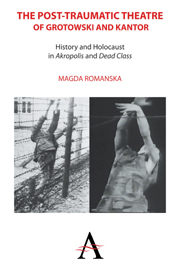 The Post-traumatic Theatre of Grotowski and Kantor
The Post-traumatic Theatre of Grotowski and Kantor Book contents
- Frontmatter
- Contents
- Foreword by Kathleen Cioffi
- Preface
- Acknowledgments
- List of Illustrations
- Introduction
- Part I Our Auschwitz: Grotowski's Akropolis
- Chapter 1 Jerzy Grotowski: A Very Short Introduction
- Chapter 2 Native Son: Grotowski in Poland
- Chapter 3 Grotowski: The Polish Context
- Chapter 4 Grotowski, the Messiah: Coming to America
- Chapter 5 The Making of an Aura
- Chapter 6 On Not Knowing Polish
- Chapter 7 “In Poland: That is to Say, Nowhere”
- Chapter 8 Akropolis/Necropolis
- Chapter 9 The Vision and the Symbol
- Chapter 10 “This Drama as Drama Cannot Be Staged”
- Chapter 11 Two National Sacrums
- Chapter 12 “Hollow Sneering Laughter”: Mourning the Columbuses
- Chapter 13 Against Heroics
- Chapter 14 Representing the Unrepresentable
- Chapter 15 Trip to the Museum
- Chapter 16 Bearing the Unbearable
- Chapter 17 The Living and the Dead
- Chapter 18 Jacob's Burden
- Chapter 19 The Final Descent
- Chapter 20 Textual Transpositions
- Chapter 21 Akropolis After Grotowski
- Part II Our Memory: Kantor's Dead Class
- Postscript
- Appendix
- Notes
- Bibliography
- Index
Chapter 2 - Native Son: Grotowski in Poland
from Part I - Our Auschwitz: Grotowski's Akropolis
- Frontmatter
- Contents
- Foreword by Kathleen Cioffi
- Preface
- Acknowledgments
- List of Illustrations
- Introduction
- Part I Our Auschwitz: Grotowski's Akropolis
- Chapter 1 Jerzy Grotowski: A Very Short Introduction
- Chapter 2 Native Son: Grotowski in Poland
- Chapter 3 Grotowski: The Polish Context
- Chapter 4 Grotowski, the Messiah: Coming to America
- Chapter 5 The Making of an Aura
- Chapter 6 On Not Knowing Polish
- Chapter 7 “In Poland: That is to Say, Nowhere”
- Chapter 8 Akropolis/Necropolis
- Chapter 9 The Vision and the Symbol
- Chapter 10 “This Drama as Drama Cannot Be Staged”
- Chapter 11 Two National Sacrums
- Chapter 12 “Hollow Sneering Laughter”: Mourning the Columbuses
- Chapter 13 Against Heroics
- Chapter 14 Representing the Unrepresentable
- Chapter 15 Trip to the Museum
- Chapter 16 Bearing the Unbearable
- Chapter 17 The Living and the Dead
- Chapter 18 Jacob's Burden
- Chapter 19 The Final Descent
- Chapter 20 Textual Transpositions
- Chapter 21 Akropolis After Grotowski
- Part II Our Memory: Kantor's Dead Class
- Postscript
- Appendix
- Notes
- Bibliography
- Index
Summary
By 1969, Grotowski “[enjoyed] a god-like status among the experimental troupes of the West.” Following his 1968 Edinburgh success, where he was referred to as “the Edinburgh Festival's biggest theatrical catch,” his position in Western European and American avant-garde circles was well-established. Even before arriving on American soil, Grotowski's troupe was “preceded by its reputation for being one of the most important experimental companies in the world,” and “perhaps the most celebrated acting troupe in the world.” Grotowski was called “an unquestioned genius of modern dramatic innovation” “one of the greatest artists in the theatre that has ever lived” and “the third great original theater mind of the century [after Stanislavsky and Artaud].” Writing for the New York Times, Clive Barnes rhetorically asked and answered: “Is Grotowski one of the great theatrical innovators of our time? Yes.” The accolades, some sincere, some ridiculously pretentious, seemed to come from every direction, prompting Ronald Bryden to sardonically note, “Grotowski: such is the theatre's newest name of God. He is the magis’ mage, guru of the gurus: the ultimate to which Living Theatre, Peter Brook and the Tulane Drama Review bow down.”
However, while Grotowski was acclaimed abroad, particularly in America, his position in Poland was ambiguous to say the least. Both Polish theatre professionals and audiences treated him with suspicion, mostly ignoring his work and his group.
- Type
- Chapter
- Information
- The Post-traumatic Theatre of Grotowski and KantorHistory and Holocaust in 'Akropolis' and 'Dead Class', pp. 57 - 61Publisher: Anthem PressPrint publication year: 2012
